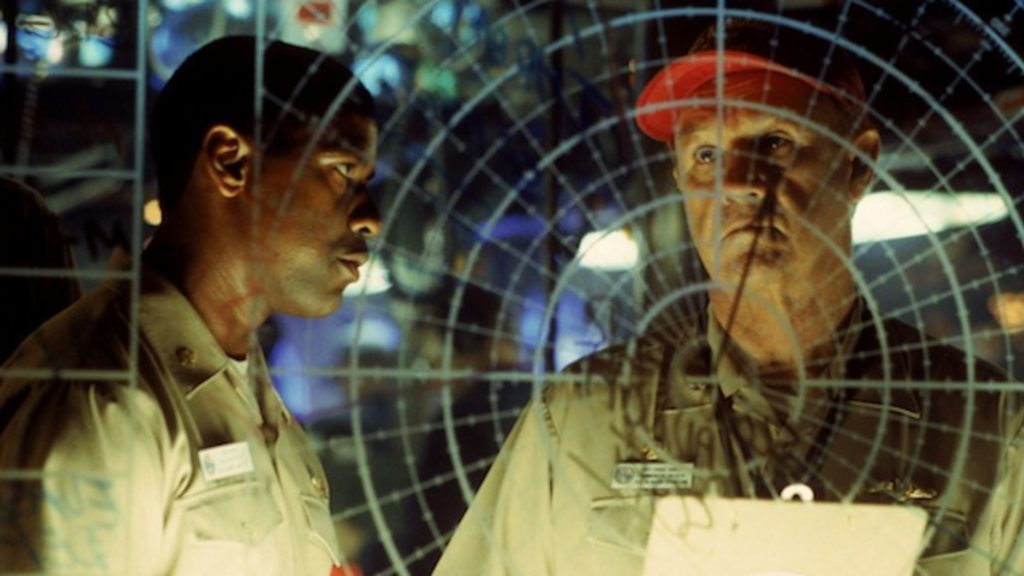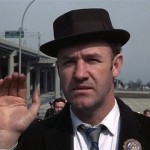Crimson Tide Review

RATING: 



(4 STARS)
Tony Scott’s 1995 submarine film has one of the most clever titles in movie history. It most obviously references the name of the ship where most of the film’s action takes place – the U.S.S. Alabama. Crimson is a color that also evokes imagery from the Soviet Union, and while Crimson Tide is set in a fictionalized version of the real post-Berlin Wall world order, it certainly feels like an old Cold War thriller.
Most notably and cleverly, however, is the suggestion that there’s blood in the water, and it’s in that space that the film is most effective. Yes, a new Cuban Missile Crisis is a great hook for a film, and it works brilliantly here, but the thing that elevates Crimson Tide above other films like it AND almost every other Tony Scott film I’ve seen (at this point, most of them) is the battle of wills between Denzel Washington and Gene Hackman. They’re sharks in a cautious but tempestuous dance with each other, and waiting for them to shed the pretense and truly engage is something special.
The film is bookended with some exposition delivered as a CNN broadcast aboard a French aircraft carrier somewhere in the Mediterranean. At the outset, we learn that Russia is in the throes of civil war. Radical separatists have seized control of a nuclear base, and the Alabama, is sent to the front lines to launch a pre-emptive nuclear attack if one is deemed necessary by the powers that be.
In need of a new executive officer, whose approval would be absolutely necessary to launch a strike, the ship’s captain, Frank Ramsey (Hackman), recruits Ron Hunter (Washington), who has the recommendations, education, experience, and temperament necessary to excel in this role and eventually become a captain himself. But Ramsey is a bit of a wild man. It’s his way or the highway when it comes to most decisions aboard his sub, and he doesn’t appear to have the same hangups as Hunter (or most other humans would) about launching nuclear weapons. To him, it’s just another tactic in the midst of a conflict that only one side can win. Hunter, meanwhile, struggles with the human impact of what a launch would mean.
For a while, these conversations and observations are entirely hypothetical, but before too long, a message comes in ordering a strike in the next 60 minutes. At the same time, a Russian sub appears out of nowhere and the two boats attempt to attack and evade each other simultaneously. The Alabama takes some damage to its communications systems, but not before receiving a portion of a follow-up to the previous “Strike” message. For Ramsey, the contents of this second message mean nothing – the order is strike, and strike they will. But Hunter feels they should do everything in their power to find out if this follow-up was their order being rescinded – that if they’re going to potentially kill millions of people, they should be 100 percent sure of it.
The scenario works so well because you understand what makes both men tick and because the positions they stake out are consistent. Additionally, the crew is populated by fun smaller characters (including a fresh-faced Viggo Mortensen and James Gandolfini) who sometimes subvert our expectations when it comes to what side they take. Then, it’s a battle of wits and will to see whether those keys will get turned. In its final third, it feels a lot like Armageddon (a film I unabashedly love before you go thinking it gets bad). These are professionals trying to get a job done that will save the world. But what makes Crimson Tide even cooler is that there’s a competing team of professionals with diametrically opposed goals that they think will also save the world.
This is, for my money, by far Tony Scott’s best-directed film. If it suffers at all, it’s with the models used during the scenes where the Alabama engages with the Russian sub, but other than that, this is a pretty flawlessly executed film. It also features a dynamite score by Hans Zimmer that’s haunting as the sub heads for open water and becomes much tenser when war feels imminent.
The stars of the film, however, are its stars – Hackman and Washington. They both inhabit their roles brilliantly, and Michael Schiffer’s screenplay gives them some really juicy dialogue to chew on (and sometimes spit in the other’s face). It’s hard for me to imagine someone not liking Crimson Tide for this reason. Even if you don’t buy into the film’s geopolitical stakes or you think my Armageddon comparison is spot on for the wrong reasons, it’s a treat to watch such locked-in actors playing off each another, and I suspect, perhaps more than any title in Scott’s filmography, I’ll be spending more time with these characters in the future.













